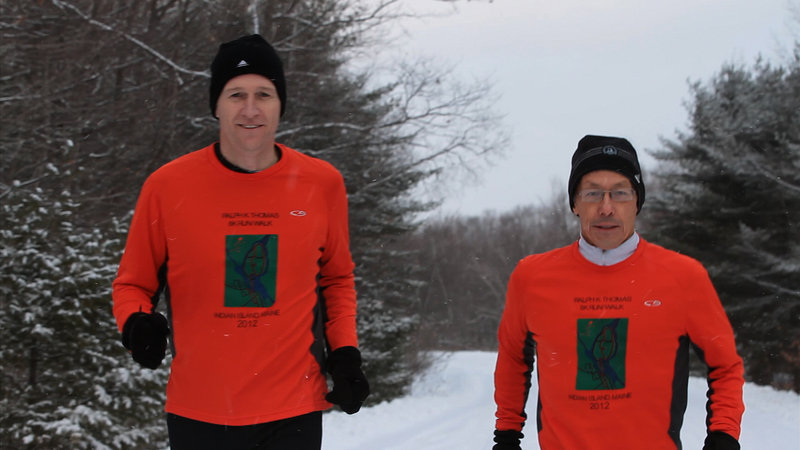Monday’s weather forecast of sun and temperatures soaring to 80 degrees in Boston doesn’t worry Bob Bryant. Marathon courses are a bit more than 26 miles, so he’ll stop 26 times for water.
That his 50-year-old legs will start aching from pounding the pavement isn’t a major concern, either. The police chief from Maine’s Indian Island will have help.
“I’ll be sort of tracing the footsteps of Andrew Sockalexis,” says Bryant. “He’ll be with me.”
Nearly 27,000 runners are entered in the Boston Marathon for thousands of reasons. Bryant, along with Dale Lolar and Barry Dana, are Team Penobscot, supported by the Nature Conservancy. The three are running to help bring life back to the Penobscot River, so important to the Penobscot Indian Nation for centuries.
That they’re also bringing life back to the memories of Sockalexis is just as significant. Maybe more emotional. The passage of time buried the Sockalexis name and the accomplishments for decades. One hundred years ago, he was one of the best marathon runners in the world.
Twice, in 1912 and again a year later, Sockalexis was runner-up at the Boston Marathon. In between, he was on the 1912 U.S. Olympic team competing in Stockholm. He ran in a killing heat. A Portuguese runner who carried his country’s flag in the opening ceremonies died. Nearly half the runners who started dropped out.
Sockalexis persevered. He finished fourth. That he didn’t move up one spot to win a bronze medal is one reason he has been overlooked.
That he died from tuberculosis in 1919 is probably another. He was only 27.
“My body will take (the heat and the 26.2 miles),” said Bryant. “Knowing (Sockalexis) finished a race and spit up blood is something I can’t forget. What he achieved in his short life is remarkable.”
That has been lost, to the rest of us in general and to younger generations on Indian Island in particular. Ed Rice, an educator and writer in Orono, has tirelessly written about Sockalexis, and in 2008 saw his book, “Native Trailblazer,” published. To Rice, Sockalexis is Maine’s forgotten athlete.
Bryant is a member of the Penobscot community, but not the Penobscot Nation like his wife and their children. He has lived on Indian Island for 25 years.
He started running only three years ago after he realized he was spending too much time behind a desk. He tells his own children and those in the community: Get out from behind the gadgets. Run. Understand your heritage. Take pride in it. Emulate your heritage.”
The Penobscot River is part of that heritage, which is why the continued cleanup, and the dismantling of dams and bringing back salmon and alewives is important. Sockalexis, the story goes, joined his father and others in a 100-mile journey from Indian Island to Mt. Katahdin. More than 100 years ago it was done by paddling a canoe and running over five days.
In 1981, Barry Dana started doing it again. Others have, too. An Old Town athlete, University of Maine graduate and former tribal chief, Dana has taught his nation’s culture for years. He runs for a purpose, he said Friday. Races don’t typically give him that purpose. This year’s Boston Marathon does.
Restoring the Penobscot River restores the Penobscot Indian Nation. Bringing Sockalexis back to life does the same thing. Dana wants to see mentors running with the Penobscot Nation’s youth, especially teens.
Dana lives with his family in the western Maine town of Solon. Bryant, as police chief, and Dale Lolar, a Penobscot and substance abuse counselor for Indian Island’s health service, are directly involved with the Penobscot Nation’s youth. Dana wants to see others.
Ralph Thomas, a Penobscot living in the Augusta area and now 77, ran in the footsteps of Sockalexis 35 years ago. In 1976, Thomas was ranked fifth in the country among marathon runners and the oldest to ever be invited to the Olympic trials.
Thomas didn’t make the U.S. Olympic team. He returned to pick up his running career in Maine and New England. Every November, the Ralph Thomas 8K road race has been run on Indian Island for the past four years to promote a legacy and a renewal.
“Ralph always told me running was a poor person’s sport,” said Bryant. “All you needed was something on your feet.”
The running will make you rich.
Staff Writer Steve Solloway can be contacted at 791-6412 or at: ssolloway@pressherald.com
Send questions/comments to the editors.



Success. Please wait for the page to reload. If the page does not reload within 5 seconds, please refresh the page.
Enter your email and password to access comments.
Hi, to comment on stories you must . This profile is in addition to your subscription and website login.
Already have a commenting profile? .
Invalid username/password.
Please check your email to confirm and complete your registration.
Only subscribers are eligible to post comments. Please subscribe or login first for digital access. Here’s why.
Use the form below to reset your password. When you've submitted your account email, we will send an email with a reset code.